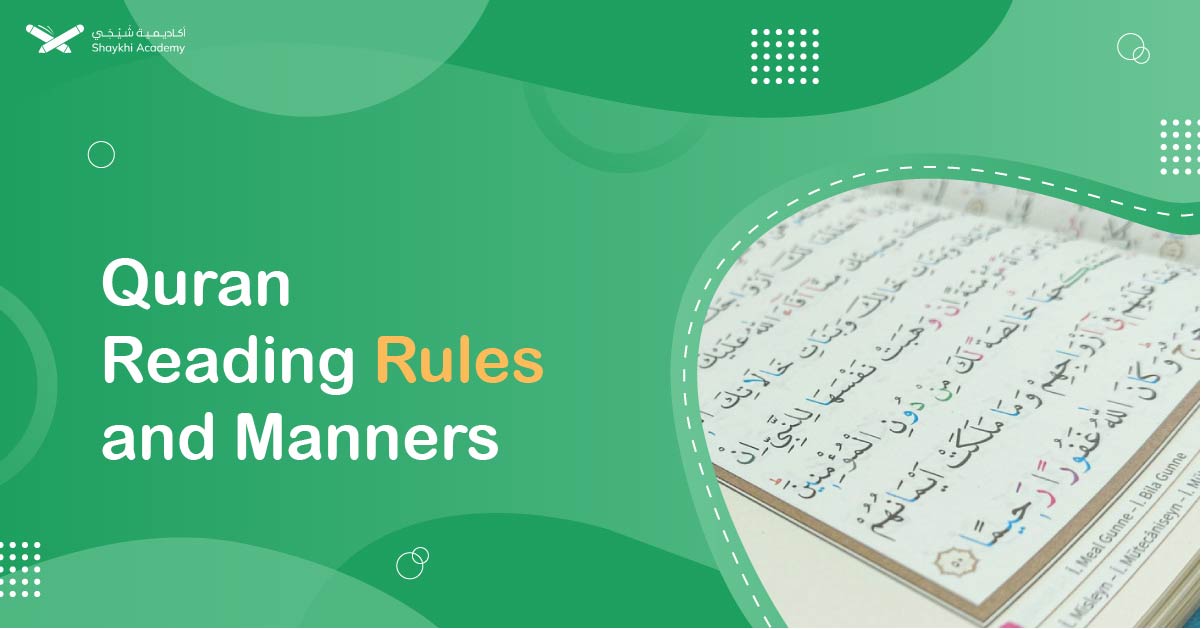Quran Reading Rules: Reading the Holy Quran demands reverence and mindfulness. Begin with purity and intention, focusing on proper Tajweed and respecting Waqf and Ibtida marks for pauses. Dress modestly, create a serene environment, and start with the basmalah. Engage with the verses, seek improvement in recitation, and maintain undivided attention. This sacred practice blends spirituality with discipline, enriching the experience of connecting with God’s words.
The Holy Quran is the word of God revealed to the Prophet Muhammad as a message to us that guides us to the good in every action and word. Therefore, reading it has its own sanctity and its technical and moral rules. So, what are the rules for reading the Holy Quran?
What are the rules and manners when reading the Quran?
Considering that reading the Holy Qur’an is a very sacred act of worship, a number of rules must be adhered to when reading it, the most important of which are:
1- Purification and ablution
In compliance with his saying – may God’s prayers and peace be upon him:
“لا يمس القرآن إلا طاهرٌ”
“No one who is in a state of ritual impurity should touch the Quran,”
It is not permissible for a person in a state of impurity to read the Quran, neither from the mushaf nor from anything else, until he has washed himself. From this, a woman must purify herself during menstruation, post-partum bleeding, and impurity as well, as it has been proven from the Prophet – may God’s prayers and peace be upon him. He said that nothing would prevent him from reading the Quran except impurity, but if it was a minor event, it is permissible to recite the Quran by heart, based on the generality of the evidence.
2- Bringing the intention
You must have the focus and intention of reading and not be distracted by whatever is happening in the surrounding environment. You are with God, reading His words and need to contemplate and understand them.
3- Adherence to the rules of Tajweed
It is necessary to adhere to the rules of Tajweed as much as possible, as the rules of Tajweed play a major role in explaining meanings in their correct meaning, and reading is not complete without them.
4- Adhere to the Waqf and Ibtida positions
As we mentioned above, Waqf and Ibtida are among the most important factors that make reading organized and also help you organize reading and understand meanings.
5- Adhere to the correct dress and proper etiquette
While reading the Quran, it is desirable for a woman to wear her hijab or prayer clothes, as it is not obligatory for a woman to cover her head while reading the Quran, because there is no legal evidence from the Quran or Sunnah that requires this, and it is desirable to use the miswak before reading the Quran as well.
What are the manners of reading the Quran?
Reading the Holy Qur’an requires us to adhere to a number of ethics in order to preserve its sanctity, including:
1- Cleanliness of body and place
In order to be able to have humility and respect for the Holy Qur’an, you must be clean and smell good.
2- Refrain from chattering while reading
You must focus all your attention on the Qur’an in which you are reading and completely refrain from focusing on other people’s affairs or exchanging opinions with them.
3- Begin with the basmalah and seek help from Satan
They are like a shield that protects you throughout the reading period
4- Intense focus
That is, not paying attention to anything other than the Holy Qur’an.
What are the Quran recitation rules?
We can talk here about the rules that improve reading and understanding through their application. They are like intonation rules whose purpose is to organize reading so as not to lose meaning, such as stopping places, starting places, and places where one must continue reading without stopping.
Let’s get to know them in detail:
1- Signs to Stop or Pause While Reading:
There are signs for stopping and starting in the Quran, which are:
- The end of the verses
The stop sign at the end of a Quranic verse. This is a recommended pause to allow for contemplation of the meaning of the verse you have just read. It is called “stop completion”.
- The obligatory stop “م”
The second sign (م) means an obligatory pause. The sign (م) above the end of some words guides the reader to stop after them, otherwise the meaning will be completely different.
- The full pause “قلي”
This sign (قلي) is called “Waqf Al-Kafi” and it indicates the reader’s choice to stop or continue, but stopping is better.
- Permissible stop “ج”
Also known as a permissible pause, this pause sign means that the reciter has the option to stop or continue his recitation without preferring one over the other.
- The permitted pause is “صلي”
This type of pause offers an optional pause during the recitation of the Quran. In this case, which is also called a good Waqf, it is preferable to continue the recitation.
- Stop sign “قف”
This sign contains the word “قف” meaning “stop,” as its symbol indicates a stop or pause in a sentence that is not directly apparent to the reader.
- Silence symbol “س”
While one of the purposes of pause marks in the Quran is to allow the reader to catch his breath while reading, whenever you encounter this symbol, you must not stop enough to catch a breath between the two words.
- Longer pause “وقفة”
The Arabic word “وقفة” is used to indicate a longer pause in a sentence without completely disrupting its flow, and does not require breathing.
- The endowment embracing ∴ ∴
This sign, called stopping or pausing, is found twice in the verse on two different words, and it means that if you stop in the first, do not stop in the second, and it is also permissible to continue reading without stopping at either of them.
2- Marks to continue reading
The following signs help us indicate the preference to continue reading:
- Continue reading “ز”
When you find the symbol “ز”, it is recommended to continue reading without stopping. However, it is permissible to stop if necessary.
- The authorized pause “ص”
Licensed pauses are not used as freely as other types of pauses. It is specially used in cases of fatigue that require a period of rest. This means that if this need does not exist, the reader should continue reading.
- No need to stop “لا”
Since the symbol “لا” means “no” in Arabic, this symbol indicates that the reader should not pause or stop reciting after this word because that exposes the meaning of the verse to the risk of change.
Quran Reading Tajweed Rules
Tajweed is a set of rules that we use to read the Holy Quran correctly and ensure the correct pronunciation of the letters. Tajweed rules include letter sounds and when they are opened or hidden, in addition to many other rules.
Reciting with Tajweed not only makes us read the Quran correctly, but also helps us understand the true message behind each verse, and if you read a word incorrectly, the meaning of the verse will change, leading to misunderstanding.
There are a number of basic Tajweed rules that must be taken into account when reading the Holy Quran, and they are:
1- Noon Sakinah and Tanween.
When you find a noon Sakinah or Tanween sign, it means that you should make the sound “nnn” when pronouncing the word.
2- Al-Izhar (to appear)
Noon is pronounced without (Ghunnah) when there are any of the following letters followed by a sukoon or tanween: [ء-ه-ع-ح-غ-خ].
Ghunnah is a nasal sound that is produced to pronounce specific letters like the letters M and N. When you try to pronounce them while holding your nose you will feel the vibration.
3- Idghaam (merging)
Idghaam is divided into two types:
- Idghaam with Ghunnah
It is used if any of the letters (ي ن م و) are found before the Noon Sakinah or Tanween.
Here, the Ghunnah is applied to the letter that follows the noon sakinah, or tanween.
- Idghaam without Ghunnah
This is what is used if one of the letters (ر- ل) is found before the sakinah noon or tanween. Here you must skip the tanween or noon sakinah and pronounce the next letter without the Ghunnah.
4. Iqlaab (to convert)
Iqlaab means converting the Ghunnah to the meem when the letter ب is found after the noon sakinah or tanween. The letter ب is pronounced after it.
5. Ikhfaa (to hide)
Its role comes when we find a letter other than the letters we mentioned above, so the Noon Sakinah or Tanween is not pronounced, but rather the Ghunnah is applied. The level of Ghunnah depends on the letter that follows it.
6. Noon and Meem Mushaddad
This rule applies if there is a severity in the letter Noon or Meem. It is pronounced as a two-beat Ghunnah.
7. The meem sakinah
This rule applies when a sleep sign is found.
8. Ikhfaa Shafawy
This rule of Tajweed applies if the meem sakinah is followed by the letter ب, so you must apply the ghunnah and not pronounce the meem sakinah.
9. Idghaam Shafawy
It happens when after the meem comes another silent meem. Here the two words are combined and the ghunnah is inserted.
10. Izhaar Shafawy
When another letter comes after the meem sukun other than the letter meem, the words are not combined and the letter meem is pronounced.
11. Qalqalah
“Qalqalah” means making an echoing sound when pronouncing certain letters. The letters of Qalqalah are: [ق-ط-ب-ج-د]. Depending on the positions of the Qalqalah letters, the length of the echo sounds varies. If a letter is found in the middle of a word a fast echo is performed. If it is found at the end of the word and stops on it, the echo will be stronger. If the stop word contains the letter Qalqalah and Shaddah, it is stronger.
12. rules for Tajweed Madd.
Madd refers to extending the letter more than its natural pronunciation. The vowels are: [ا – ي – و].
This is a quick summary of the rules of Tajweed that must be followed when reading to ensure that you are reading the verses as God revealed them, with their true meaning and the correct letters.
Read more about the difference between Tajweed, Tarteel And Tafser
Can you drink while reading the Quran?
There is no specific prohibition on drinking water while reading the Quran.
Opinions may differ on this matter among scholars, but the majority say that it is permissible to drink water while reading the Quran while respecting and revereing the Quranic text. The basic principle is to deal with the Quran in a state of concentration, so drinking is permitted simply to drink and return to your concentration and not to participate in conversations during that time.
What are the rules of Tilawat?
Tilawat is a general term that includes reading the Quran, and it has degrees, the highest of which is tarteel. Reciting the Holy Quran has a number of rules that must be followed, which are:
1- Start with the basmalah
The reciter must start with the basmalah as a constant basis in the recitation.
2- Interaction with the verses
Such as prostrating in prayer in the verses that contain prostration or seeking forgiveness as soon as you read a verse that expresses God’s mercy and seeking God’s help whenever you come across a verse of torment.
3- Trying to improve the sound
It is preferable for the reciter to have a sweet voice, so you should try to improve your voice while reciting as much as possible.
4- Avoid distraction
That is, fully concentrating on the recitation and not interrupting it unless something urgent happens or one feels tired. Here, we do not suddenly interrupt the recitation, but rather say the truth of God Almighty.
Manners and etiquettes of Reading the Quran?
As we mentioned before, reading the Quran has its sanctity, so there are a number of etiquettes that must be followed while reading out of respect for the sanctity of the matter, which are:
- Observe cleanliness
It is necessary to create a clean environment, starting from your body, all the way to your clothes, and the place where you sit, and it is recommended that you perform ablution before touching the Quran.
- Respect and focus
Showing respect for the Book of God is a duty and necessity, such as placing it high and not placing anything above it.
- Appropriate dress
Wearing clean and modest clothing will help you maintain humility.
- Start requesting protection
Begin the recitation by saying “I seek refuge in God from the devil, as a means of protection from any evil influences or distractions.
- Take the appropriate position
It is part of your respect for the Qur’an that you read while you are upright, not swaying or sleeping, for example, and that you face the Qiblah whenever possible.
- Maintain focus
Reduce distractions and create a quiet reading environment away from noise and distractions.
- Prayers and repentance
Begin and end your recitation of the Quran with supplication and seeking forgiveness from God Almighty. Express your gratitude for the opportunity to process his words.
Unlock the Path to Quranic Mastery with Shaykhi Academy!
Are you seeking the finest Quranic education right from the comfort of your home? Look no further! Shaykhi Academy stands out as a premier online Quran learning platform, dedicated to providing exemplary education to both children and adults.
Why Choose Shaykhi Academy?
- Connect with highly qualified native tutors.
- Flexible scheduling to suit your busy lifestyle.
- Affordable classes tailored for all levels.
- Accessible from anywhere around the globe.
Discover Our Range of Courses:
- Arabic Noorani Qaida: Lay a solid foundation for Quranic studies.
- Online Quran Classes for Kids: Engaging lessons for lifelong learning.
- Tajweed Rules for Kids: Learn to recite with confidence.
- Quran Hifz for Kids: Step-by-step guidance to memorize the Quran.
- Quran for Adults: Introduce yourself to Quran reading and Tajweed rules.
- Online Arabic Courses: Master the language of the Quran.
- Islamic Studies: A wide range of topics related to Islam, including theology, law, Quranic studies, Hadith.
Don’t Miss Out on Your Chance to Excel!
Whether you’re a beginner or seeking advanced knowledge, Shaykhi Academy can guide you! Book your free trial now and make Ramadan 2024 your Quranic turning point!
Conclusion
Reading the Holy Quran is a sacred act guided by specific rules and etiquette. Purification through ablution is essential, ensuring one is spiritually clean before touching the Quran. Intentionality and focus are crucial, maintaining reverence and avoiding distractions.
Adherence to Tajweed rules enhances proper pronunciation and understanding, while observing Waqf and Ibtida marks organizes recitation pauses. Respectful attire and a clean environment are encouraged, along with starting with the basmalah.
Tilawat, encompassing Quranic recitation, includes interacting with verses and striving for improvement. Ultimately, reading the Quran is a profound act requiring mindfulness, humility, and spiritual preparation.













































